Walk into any HR office in Addis Ababa or Hawassa, and you’ll likely spot the same scene: overstuffed file cabinets, half-filled Excel sheets, and a frustrated HR officer toggling between emails and printouts just to approve a single leave request. For many Ethiopian businesses, especially those growing beyond 20–30 employees, this chaos has become all too familiar.
It’s no surprise then, that a digital wave is sweeping through Ethiopia’s HR landscape. From tech startups around Bole to manufacturing firms in Dukem Industrial Park, companies are ditching spreadsheets for smarter, scalable HR software.
If you're wondering which tool suits your team best, we've curated a local-first list of the top 10 HR software platforms used by Ethiopian businesses in 2025. The focus? Tools that understand our unique compliance needs, offer regional support, and can grow with your organization. And leading the list is a name that’s fast gaining trust across East Africa.
Why Ethiopian HR Teams Are Going Digital
Ask any HR manager from a mid-sized company in Mekelle or Bahir Dar, and they'll tell you—manual HR isn’t just slow, it’s risky. You can’t afford a payroll error when taxes and pension contributions need to be filed with the Ethiopian Revenues and Customs Authority (ERCA) on time.
Key Reasons for HR Tech Adoption in Ethiopia
- Local Compliance: Software ensures accurate calculation of income tax, pension contributions, and statutory leave.
- Scalability: Whether you're expanding to new branches in Dire Dawa or growing headcount in Addis, software scales with you.
- Transparency: Mobile apps and dashboards give employees visibility into their leave, payroll, and performance records.
What Makes an HR Software “Ethiopia-Ready”
Not every international tool works well in the Ethiopian context. Here’s what to look for:
- Payroll compatibility with Ethiopian tax laws
- Mobile-first design for dispersed teams and on-field employees
- Bilingual support (Amharic/English) or intuitive interface
- Local or regional support availability
- Affordable pricing models suitable for SMEs, NGOs, and enterprises alike
Note: Pricing mentioned below is an approximation in Ethiopian Birr (ETB) for local relevance. Actual prices may vary with exchange rates and plans.
Top 10 HR Software Platforms Used by Ethiopian Businesses in 2025
1. peopleHum – Designed for Growth, Loved by HR Teams
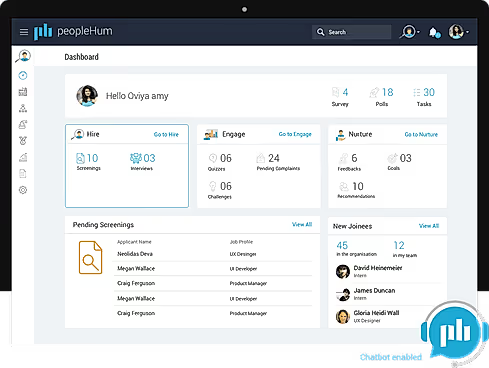
peopleHum is a powerful yet approachable platform built to simplify HR operations for small and scaling Ethiopian businesses. From managing payroll to tracking leave, automating hiring, and conducting performance reviews, everything is centralized in one smart, AI-powered system. It’s a favorite among HR teams in fintech and logistics firms across Ethiopia.
Key Features:
- Automated payroll with Ethiopian tax compliance
- AI-powered hiring and onboarding
- Leave and attendance management
- Performance reviews and feedback cycles
- Customizable HR workflows and mobile accessibility
Pros:
- Easy for distributed teams to use
- Complies with ERCA and pension rules
- Scalable with modular structure
- AI automation and intuitive dashboard
Cons:
- Onboarding required to unlock advanced modules
Pricing: Approx. ETB 120/employee/month
2. Sage HR – A Global Solution with Reliable Structure

Sage HR is a sleek HR software solution commonly used by globally connected firms in Ethiopia. It simplifies processes like leave management and employee goals but doesn’t include local payroll support, making it better for companies with external payroll processing.
Key Features:
- Leave tracking and approvals
- Shift scheduling and workforce planning
- Goal setting and performance management (OKRs)
- Customizable workflows and approvals
Pros:
- Clean, global-ready interface
- Excellent for managing teams and performance
- Good reporting features
Cons:
- Doesn’t support Ethiopian tax and payroll systems
Pricing: Approx. ETB 4000–6000/user/month
3. PayDay SaaS – Payroll Made Easy for African Businesses
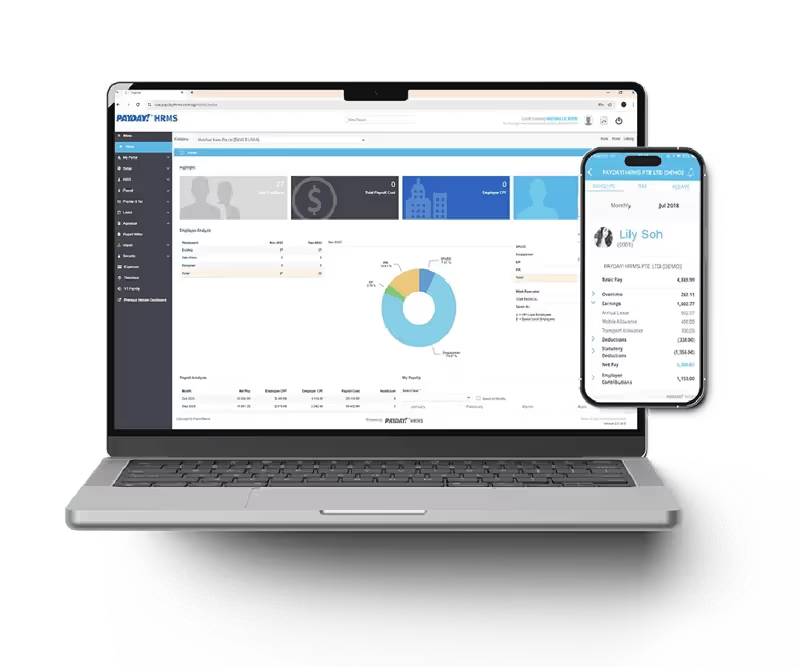
PayDay SaaS is built specifically for African SMEs and provides local payroll automation without the fluff. It’s used by small businesses and nonprofits in Ethiopia that need legally compliant payslips, deductions, and payroll reports fast.
Key Features:
- Payroll automation and payslip generation
- NSSF and pension compliance
- Employee records and audit trails
- Statutory deductions and salary history
Pros:
- Fast to set up and run
- Localized for Ethiopian compliance
- Affordable for small teams
Cons:
- No built-in performance or recruitment modules
Pricing: Approx. ETB 1800–3000/user/month
4. Talstack – Local Talent Management with Global Standards
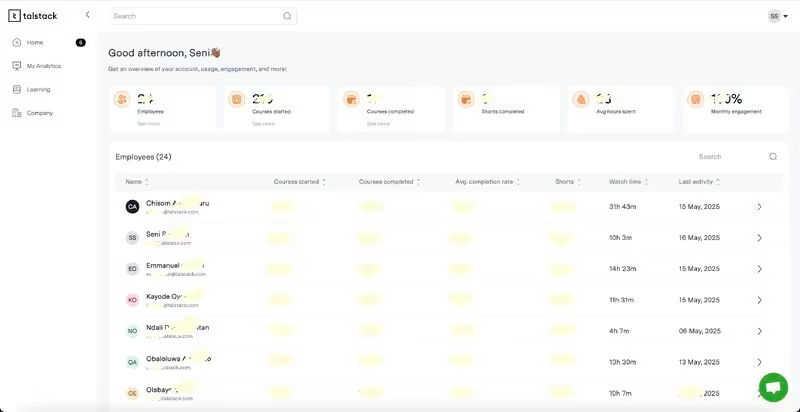
Talstack is a learning and development-focused HR platform growing in popularity among Ethiopian companies that value internal mobility and growth. It's ideal for training managers, HRDs, and organizations focused on building skills over time.
Key Features:
- Learning paths and course tracking
- Skill mapping and progress dashboards
- Performance appraisals and feedback
- Employee growth and promotion tracking
Pros:
- Engaging and intuitive interface
- Great for long-term workforce development
- Customizable learning modules
Cons:
- Lacks payroll and compliance tools
Pricing: Approx. ETB 2000–3500/user/month
5. Workpay Africa – Built for African Payroll

Workpay Africa is a regionally-focused HR software with full Ethiopian tax and payroll compliance baked in. From payroll calculations to employee self-service, it’s designed for local businesses, NGOs, and midsize enterprises.
Key Features:
- Local payroll and statutory deduction engine
- Employee self-service portal
- NSSF, PAYE, and pension calculations
- Attendance and shift tracking
Pros:
- Designed specifically for African businesses
- Strong local support and documentation
- Quick setup and clean UI
Cons:
- Fewer recruitment or performance tools
Pricing: Approx. ETB 2500–4000/user/month
6. Deel – For Startups Scaling Beyond Borders
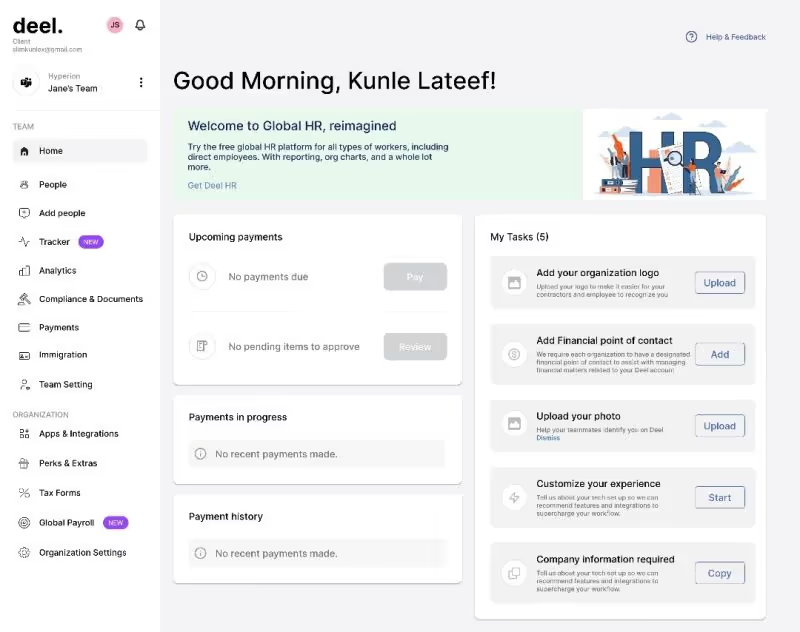
Deel is perfect for Ethiopian startups or NGOs that hire globally. It simplifies international payroll, contracts, and compliance — letting you employ people legally in 150+ countries without setting up an entity.
Key Features:
- Employer of Record (EOR) services
- Global payroll and contractor payments
- Compliance with international tax laws
- Contract generation and document management
Pros:
- Perfect for globally remote teams
- Legally covers international hiring
- Easy to use with built-in templates
Cons:
- Not ideal for Ethiopia-only teams
- Higher pricing for small orgs
Pricing: Starts from ETB 20,000+/user/month
7. PaySpace – Serious Payroll for Serious Employers
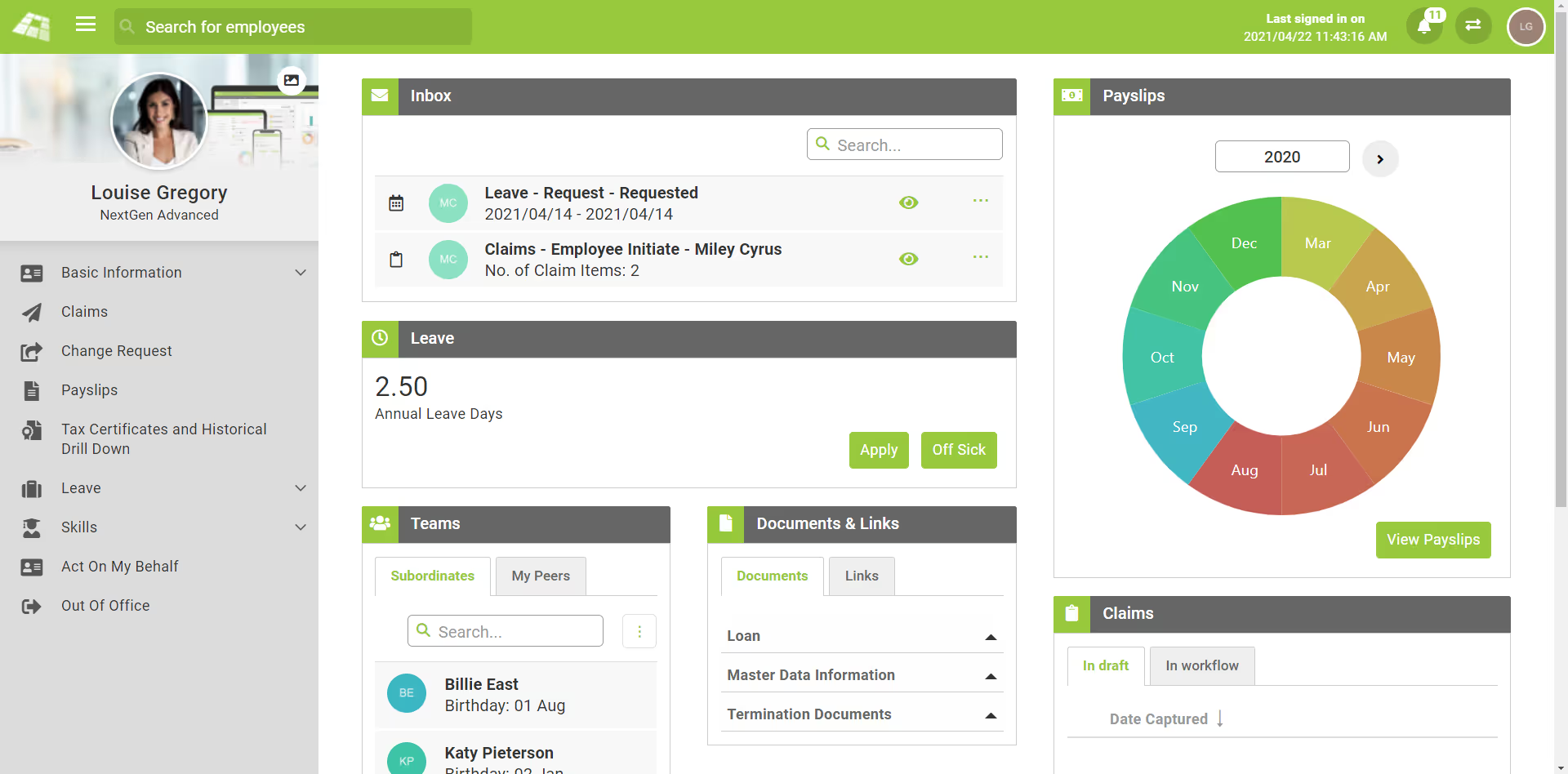
PaySpace is a robust enterprise-grade solution used by major Ethiopian banks and factories. It specializes in large-scale payroll processing and multi-country compliance, though its interface feels dated.
Key Features:
- Enterprise payroll with tax compliance
- Employee lifecycle management
- Real-time analytics and reporting
- Multi-country payroll functionality
Pros:
- Excellent for managing large headcounts
- African compliance built-in
- Highly reliable at scale
Cons:
- Complex setup and learning curve
- Outdated UI
Pricing: Approx. ETB 6000–9000/user/month
8. Keka – Employee-First HR with Visual Appeal
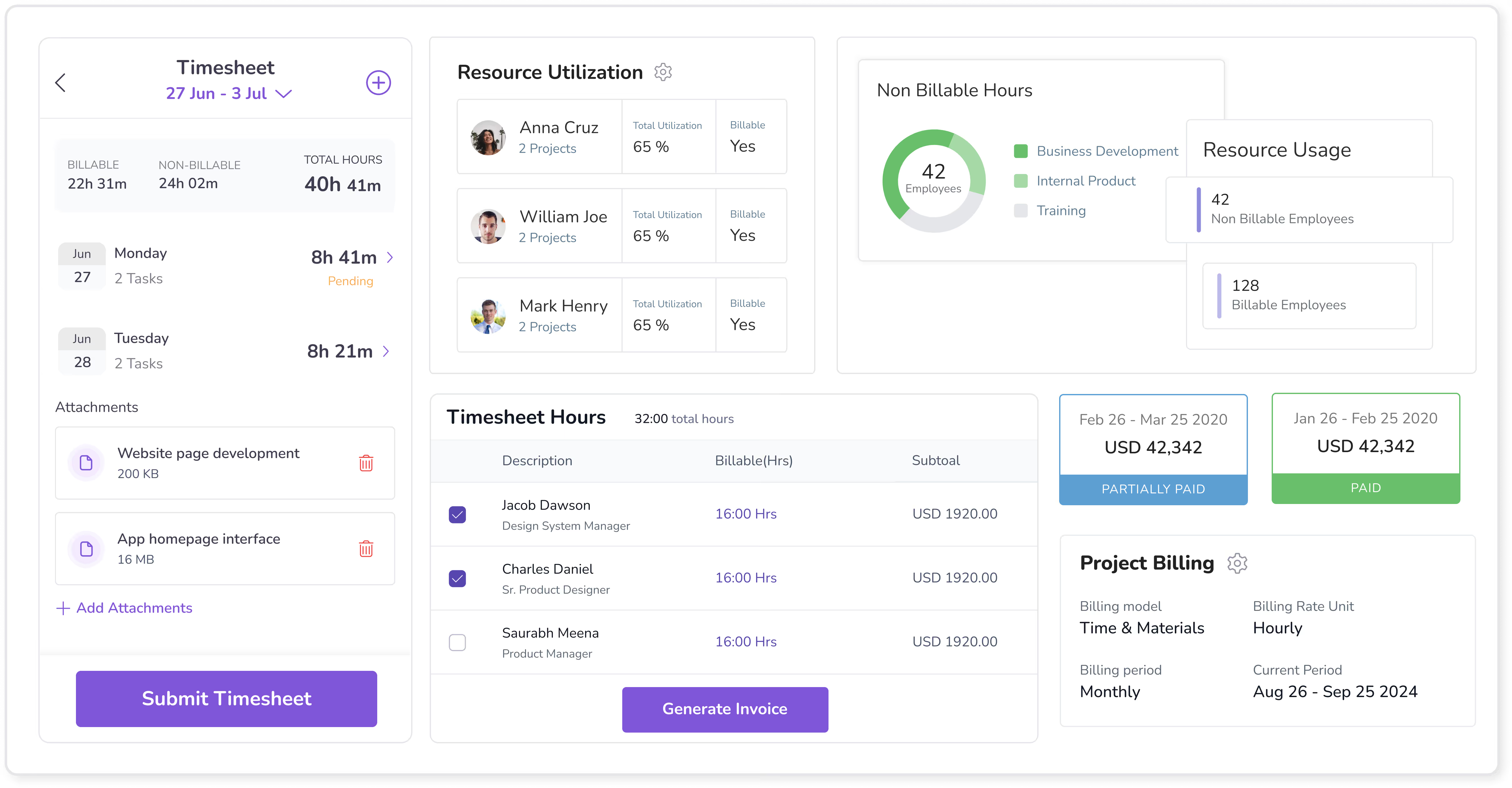
Keka offers beautiful dashboards and a smooth user experience, making it ideal for Ethiopian creative firms, IT teams, and startups. It focuses on engagement and self-service, though it may lack deep localization for compliance.
Key Features:
- Leave and attendance tracking
- Payroll and performance dashboards
- Mobile-first employee portal
- Team engagement tools
Pros:
- Clean, modern UX
- High employee adoption rate
- Good reports and analytics
Cons:
- Requires external payroll customization for Ethiopia
Pricing: Approx. ETB 2500–4000/user/month
9. OrangeHRM – Open-Source for DIY HR Teams
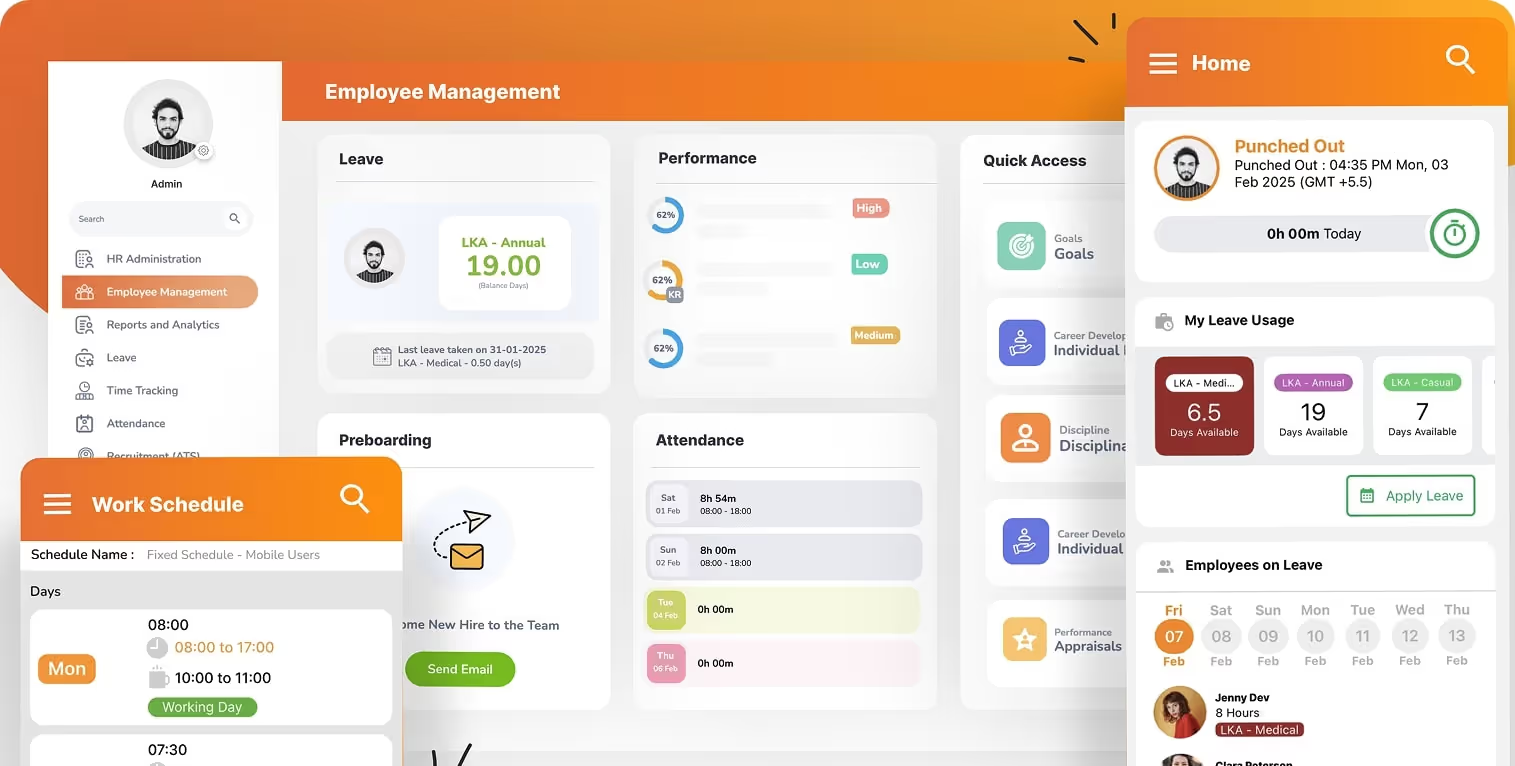
OrangeHRM is a flexible, open-source HR system often used by Ethiopian NGOs and orgs with technical teams. You can customize modules for your HR needs and host it internally or on the cloud.
Key Features:
- Time tracking and leave approvals
- Recruitment and onboarding
- Performance and training modules
- Admin-level customization
Pros:
- Free base version
- Highly customizable
- Global community and support forums
Cons:
- Requires internal IT help for setup and maintenance
Pricing: Free to ETB 2000+/month (depending on hosting/services)
10. 247HRM – Simple, Straightforward HR for Small Businesses
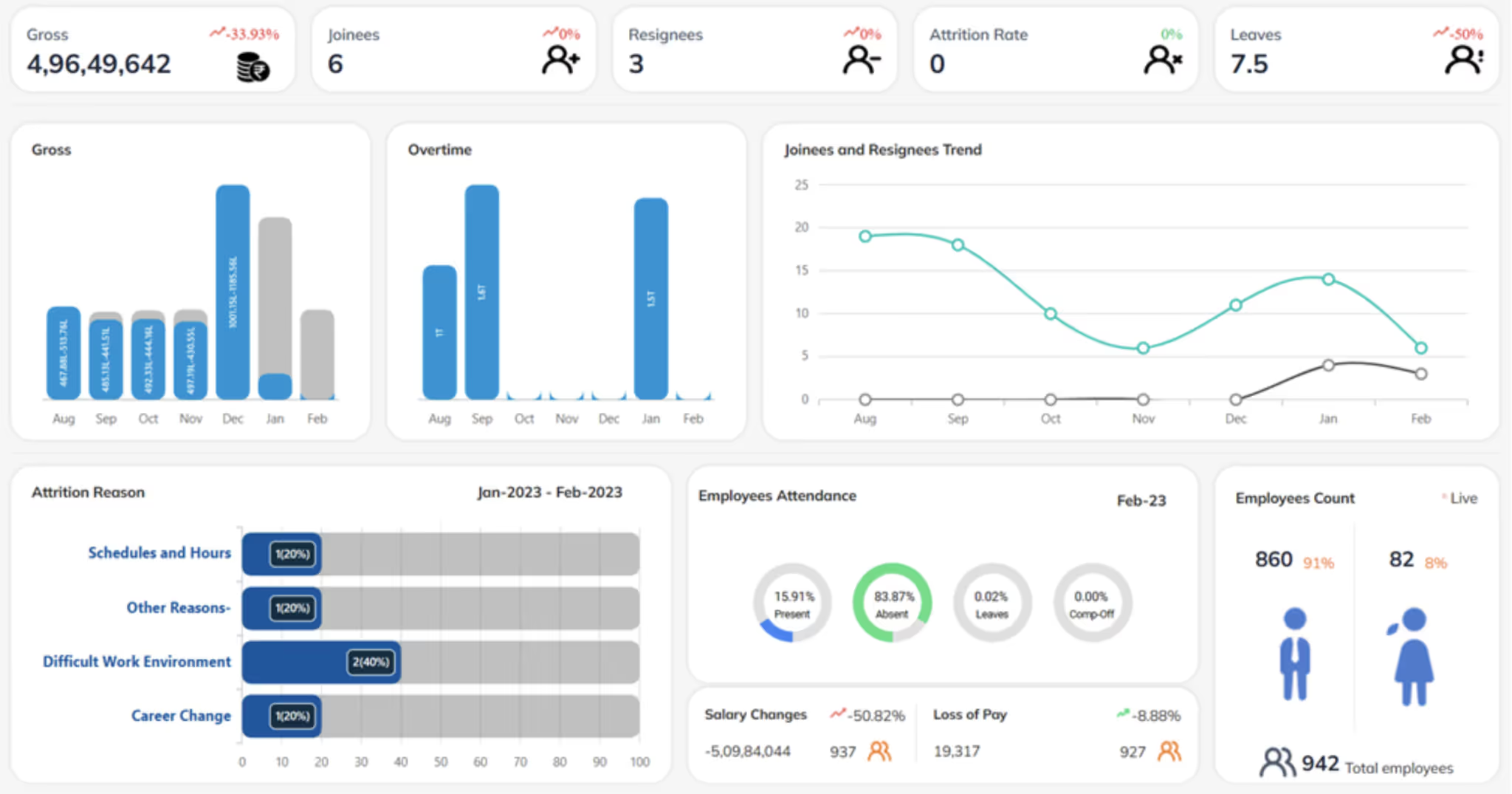
247HRM is built for small and early-stage Ethiopian businesses needing basic HR tech. It covers the essentials without being overwhelming — ideal for bakeries, local shops, or solo HR managers.
Key Features:
- Basic payroll and leave tracking
- Attendance and onboarding tools
- Self-service options for employees
- Reporting for management
Pros:
- Affordable and easy to use
- Quick implementation
- No technical knowledge required
Cons:
- Not designed for scaling or complex orgs
Pricing: Approx. ETB 1000–1500/user/month
Final Thoughts: What Your HR Team Deserves
From bustling startup hubs in Addis Ababa to expanding farms in Oromia, the demand for smart, scalable HR tools is real—and rising. Ethiopian HR leaders no longer have to settle for one-size-fits-all global tools that ignore local realities.
peopleHum, with its balance of automation, affordability, and compliance-readiness, offers a serious solution for businesses ready to modernize their HR stack.
Ready to Take Your HR Digital?
Book a free demo of peopleHum and see how it can transform your HR processes—whether you’re onboarding in Bahir Dar or managing payroll in Mekelle.
Your team deserves better. Let’s make HR easier, together.
FAQ's
1. How do I choose the right HR software for a small or growing business?
Look for an HR solution that’s easy to start with but doesn’t limit your growth. peopleHum’s modular design means you can begin with just payroll or leave tracking, and add performance reviews, engagement tools, or recruitment modules as you grow. It’s especially ideal for Ethiopian startups and SMEs with future plans to scale.
2. Is it better to use a global tool like Deel or a local tool like Workpay?
It depends on your business needs. Deel is great for global hiring, and Workpay offers localized payroll—but if you’re looking for the best of both worlds, peopleHum combines global quality with regional relevance. It supports distributed teams, is mobile-friendly, and has features tailored for African markets like Ethiopia.
3. Can I get an HR solution that handles both payroll and performance reviews?
Yes, and peopleHum does exactly that. From payroll automation and attendance tracking to performance evaluations and 360-degree feedback, everything is integrated into one easy-to-use platform. You won’t need to juggle multiple tools or systems.
4. What if I only need basic payroll without complex features?
peopleHum allows you to start small. You can use just the payroll module to manage salaries, deductions, and payslips, and skip the extras until you're ready. Plus, it ensures compliance with Ethiopian tax laws—something most basic tools often miss.
5. Do these HR platforms support Amharic or local languages?
While most global platforms don’t offer Amharic, peopleHum’s UI is built for simplicity and is easy to use across languages—even for non-English speakers. Its mobile-first design also helps teams with limited tech experience get started quickly.
6. How does pricing usually work for HR software in Ethiopia?
Most HR software charges per employee per month. With peopleHum, you get enterprise-grade features starting at just ETB 120/employee/month. It’s affordable for startups and scalable for large organizations—with no hidden costs or complex onboarding fees.
7. Can I integrate HR software with accounting, payroll, or biometric systems?
Absolutely. peopleHum offers integrations with popular accounting systems and biometric attendance tools, making it easy to sync your existing workflows. This makes it a smart, future-proof choice for growing Ethiopian companies.















































